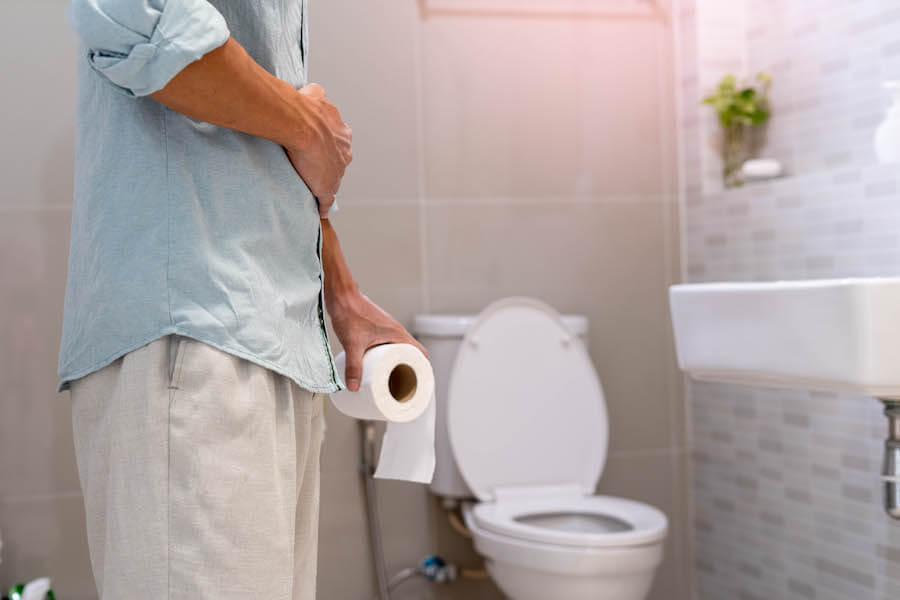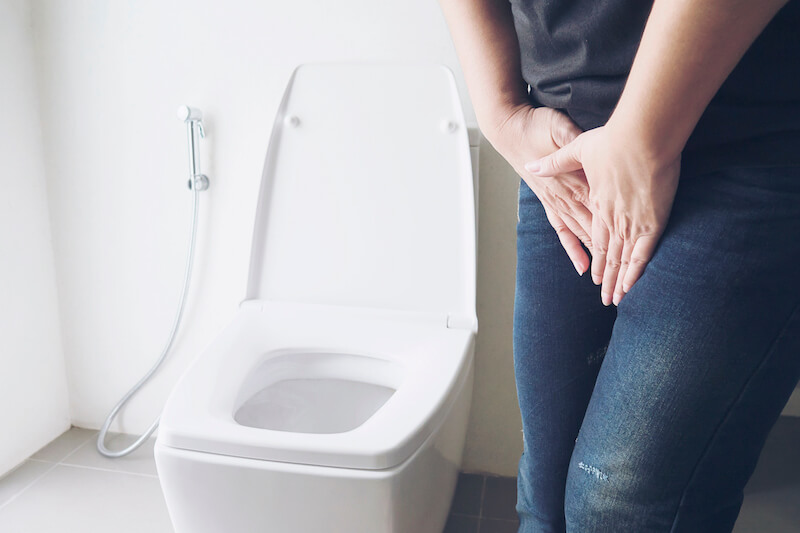What is dysuria?
Dysuria is a symptom of pain and/or burning or itching in the urethra (the urinary tube) or urethral canal during urination. It is a very common urinary symptom that most people experience at least once during their lifetime. Women are more prone to experiencing dysuria, and the most common cause is urinary tract infections (UTI). Painful urination can also be caused by vaginal infections, prostate diseases, bladder issues, diabetes, kidney stones, and other conditions. The treatment depends on the underlying cause and may range from antibiotics to avoiding irritants or treating the underlying condition.”
Who can get dysuria (painful urination)?
Men and women of any age can experience painful urination. Urinary tract infections (UTI) are typically more common in women. In men, it occurs more often in the elderly. There is a higher risk of dysuria for the following groups:
- Pregnant women
- Individuals with diabetes
- People who use certain medications
- Men and women with any type of bladder disease
- Individuals with kidney infection and kidney stone
- Men with an enlarged prostate
Symptoms
Symptoms of painful urination can vary between men and women, but both genders commonly describe it as:
- burning
- pain
- and/or itching
Burning during urination is the most common symptom. Pain can occur at the beginning of urination or after urination. Pain at the beginning of urination is often a sign of a urinary tract infection. Pain after urination may indicate bladder or prostate problems. In men, pain can occur and persist in the penis before and after urination. Symptoms in women can be both internal and external. Pain outside the vaginal area may be caused by inflammation or irritation of this sensitive mucous membrane. Internal pain in the lower abdomen may be a symptom of a urinary tract infection.
Other symptoms that may occur include:
- Discharge from the penis or vagina
- Cloudy or urine with an unpleasant odor
- Frequent urge to urinate
- Passage of stones in the kidney or bladder
- Blood in the urine
- Nausea or vomiting
- Itching in the genital area
- High temperature
- Back or flank pain
IMPORTANT: Seek medical attention if painful urination and burning persist for more than 24 hours. Also, pregnant women who experience burning during urination should promptly consult a doctor.

Causes of dysuria
There are many causes of dysuria, among which the main ones for both men and women are:
Urinary tract infections (UTIs)
UTIs are much more common in women than in men due to differences in anatomical structure. In women, bacteria can more easily reach the bladder because of a shorter urethra compared to men. The reason for most UTIs affecting the bladder and urethra is the bacterium Escherichia coli (E. coli) or other bacteria normally found in the digestive tract.
Women who use the wrong wiping technique, from back to front instead of front to back, or who bathe instead of showering, may be at a greater risk of urinary tract infection due to contamination of the urethral canal with perirectal and other bacteria. Because of the higher likelihood of recurrent urinary tract infections, women also have a higher risk of experiencing pain during urination more frequently than men.
Most urinary tract infections are uncomplicated and relatively easy to treat. However, persistent dysuria may be associated with more complicated urinary tract infections and other conditions (renal insufficiency, anatomical or functional abnormalities of the urinary tract, pelvic floor dysfunction, overactive bladder, prostatitis, prostate cancer)
Urethritis, or inflammation of the urethra
Urethritis, or inflammation of the urethra (the urinary tube), can also cause painful urination. The main causes are usually sexually transmitted infections such as gonorrhea and chlamydia, reactions to irritating chemicals, or irritation from catheter insertion.
Kidney infections
Kidney infections occur when bacteria reach the kidneys from the bladder. Pregnant women, individuals with diabetes, those with a history of kidney stones, and men with an enlarged prostate are at a higher risk of experiencing upper urinary tract infections.
Bladder infection (cystitis)
Women aged 20 to 50 are more likely to experience bladder infections and painful urination. Pregnant women, individuals with diabetes, postmenopausal women, and those with bladder conditions also have a higher risk of bladder infections and dysuria. Cystitis is also more common in older men.
Bladder spasms
Spasm of the bladder muscles usually occurs with other symptoms of inflammation. Pain during urination triggers contractions of the bladder muscles.
Urinary tract tumors
Blood in the urine is the main symptom but depending on the location and size of the tumor, it may be accompanied by difficult, painful urination, and burning sensation.
Sexually transmitted infections
Burning and pain during urination can be caused by some sexually transmitted infections such as gonococcal infections (gonorrhea), genital herpes, HPV infections, infections caused by chlamydia, mycoplasmas.
Bladder damage due to radiation therapy
Radiation therapy can lead to inflammation of the bladder and damage (severity depends on the radiation dose and the number of treatments).
Side effects of certain medications and supplements
Some medications that affect increased fluid elimination, such as diuretics, antihypertensives, and potassium.
Certain types of food
Beverages with caffeine (coffee), carbonated drinks, alcohol, citrus fruits, and spicy foods can increase irritation of the urethra.
Causes of dysuria in women
Painful urination in women can be a consequence of other conditions, as well as infections outside the urinary tract:
Vaginitis, or inflammation of the vagina
Vaginitis or inflammation of the vagina can also cause painful urination. Vaginitis may be caused by an allergic reaction to chemicals (such as spermicides, soaps), low estrogen levels (especially during menopause), fungal infections (candidiasis), bacterial vaginosis, or sexually transmitted infections (trichomoniasis).
Endometritis
Endometritis, inflammation of the uterine lining in the acute phase, can manifest as difficult and painful urination.
Ovarian cysts
Ovarian cysts can press on the bladder and cause painful urination.
Causes of dysuria in men
Men can experience pain and burning during urination if they have:
Prostate conditions (prostatitis, benign prostatic hyperplasia – BPH):
- Prostatitis: a painful condition usually caused by inflammation. Prostatitis often leads to painful or difficult urination, as well as pain in the groin, pelvic area, or genitals. Some, but not all, cases of prostatitis are caused by bacterial infections.
- Benign prostatic hyperplasia BPH: a non-cancerous enlargement of the prostate that can result in difficult and painful urination.
- Prostate cancer: one of the most common malignancies in men. Depending on the stage of the disease and the extent of the tumor affecting the prostate, difficult and painful urination may occur along with other symptoms.
Non-specific urethritis
The most common cause of male urethritis is infection from sexually transmitted pathogens such as bacteria (gonorrhea, chlamydia, and mycoplasma).

Diagnostics and tests for dysuria
Detecting the cause of dysuria begins with a detailed medical history and a thorough physical examination. The doctor gathers detailed information from the patient about the frequency of urination, symptoms experienced during urination, such as burning, itching, pain, or the presence of blood, whether there is abdominal pain, lower back pain, whether the patient has diabetes, oncological diseases, and in women, the doctor may suggest a pregnancy test. The doctor also asks about the patient’s sexual habits, as sexually transmitted diseases can be a cause of pain during urination.
Urinalysis
To determine the cause of painful urination, the doctor may request a urine analysis from the patient to check for the number of white blood cells (leukocytes), red blood cells (erythrocytes), proteins, glucose, and foreign chemicals in the urine. The presence of white blood cells in the urine may indicate a urinary tract infection.
Urine culture reveals the presence of a urinary tract infection and identifies the bacteria causing it. This information allows the doctor to choose the most effective antibiotic for treating the bacterial infection.
If the urine sample does not reveal the causative agents of the infection, the doctor may suggest additional diagnostic tests for the bladder, as well as a prostate exam for men and a gynecological exam for women.
Vaginal mucosa swab
This test can identify the causes of infection in women (fungal, bacterial).
Urethral swab for men and women: indicates a possible bacterial infection or the presence of a sexually transmitted disease.
Ultrasound, Magnetic Resonance Imaging (MRI) and CT scanner
In cases of suspected pyelonephritis (kidney inflammation), stones, or obstruction of the urinary tract, malignancy, or when the patient does not respond to antibiotic therapy, ultrasound, magnetic resonance imaging or CT scanner are used for diagnosis. Both MRI and CT provide high-quality images, facilitating the easy diagnosis of urinary tract infections.
Cystoscopy
An invasive test that can be used to examine the condition of the bladder or urethra. Cystoscopy can help identify the causes of various urinary tract symptoms, such as painful or burning urination, frequent urination, inability to completely empty the bladder, blood in the urine, pelvic pain, and frequent urinary tract infections.
Treatment of dysuria
The treatment of dysuria depends on the cause of pain and burning during urination. The most common cause of dysuria is a urinary tract infection, which is successfully treated with antibiotics.
When there is a suspicion of a complicated urinary tract infection, especially if it is accompanied by symptoms such as nausea, vomiting, high fever or chills, additional tests such as blood culture (detecting microorganisms in the blood), complete blood count, and detailed diagnostics are needed in addition to the initial antibiotic therapy.
Pain during urination caused by bladder or prostate conditions is treated by addressing these underlying conditions.
During treatment, drink plenty of water and consume teas to alleviate discomfort during urination (such as nettle tea and cranberry tea), as well as supplements that can be found in pharmacies.
Use pain relief medications if necessary.
Prevention of dysuria
- Drink more water, two to three liters of water per day.
- Avoid scented laundry detergents and aggressive hygiene products to reduce the risk of irritation.
- Use condoms during sexual activity.
- Pay attention to intimate hygiene (especially women)
- Adjust your diet to eliminate foods and beverages that can irritate the bladder (such as highly acidic foods, caffeine, and alcohol)
Prognosis
Dysuria typically lasts for a few days, but sometimes it can persist longer depending on the underlying cause. Urinary tract infections or sexually transmitted diseases are usually short-lived if detected early and treated with antibiotics. In the case of a kidney infection, it may take more than a week for the symptoms to disappear.
When to visit a doctor
Painful urination is an uncomfortable symptom, so it is advisable to seek medical examination to determine its cause. The sooner you visit a doctor, the sooner a diagnosis can be made, and treatment can be initiated.
Visit a doctor if:
- Painful urination persists for an extended period.
- There is discharge from the penis or vagina.
- Urine has an unpleasant odor or appears cloudy, contains blood.
- There is pain in the back or flank.
- Kidney stones have been passed.
- Pain and burning sensation during urination in pregnancy.

Life with dysuria
Depending on the cause of dysuria, symptoms may last for several days or much longer if it involves conditions that require prolonged treatment.
For discomfort caused by urinary infections, it may be sufficient to follow the prescribed antibiotic therapy, stay well-hydrated, and avoid foods that irritate the urethra.
Take probiotics in consultation with your doctor. Probiotics can help fight harmful bacteria and fungi that may cause dysuria. If you have been diagnosed with a urinary tract infection, sexually transmitted diseases, or a fungal infection and are treating them with antibiotics, probiotics can help mitigate the negative side effects of these medications.
Eat foods rich in vitamins and minerals to strengthen your immune system as you fight infection.
Drink cranberry juice, which helps prevent urinary infections.
Maintaining urogenital hygiene is essential. Avoid using harsh soaps or chemical products around the genitals, as they can cause irritation and inflammation.
For other conditions and illnesses, follow the advice and treatment prescribed by your doctor.
If you are wearing a urinary incontinence pad, change it as soon as it gets dirty. After urinating, women should thoroughly wipe to remove any remaining urine.
If you find it difficult to cope with long-lasting dysuria, consult your doctor for psychological support and other forms of assistance while undergoing treatment.


